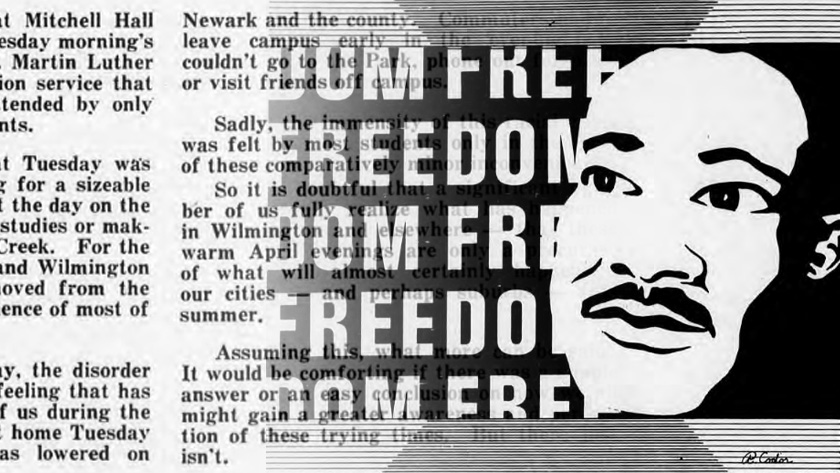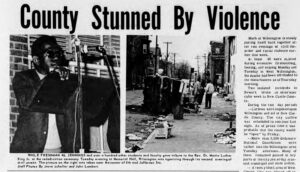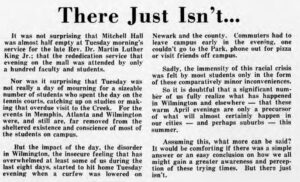
An article and an illustration from the April 12, 1968, edition of the student newspaper, The Review.
Reviewing the Voices of 1968: Anger and Apathy After Martin Luther King Jr.’s Assassination
The 1960s is noted as a revolutionary time in American history. In addition to the Civil Rights movement, the Vietnam War and a push for greater gender equality, the decade saw the assassination of three prominent leaders: President John F. Kennedy in 1963, Rev. Martin Luther King Jr. in 1968, and presidential candidate Robert Kennedy later that same year.

An article from the front page of the Friday, April 12, 1968, edition of the student newspaper, The Review.
While these headlines impacted Americans nationwide, the culmination of events made 1968 particularly notable for Delawareans. Rage over social injustice and the assassination of King, a leader who advocated for peaceful protest, set off a race riot in Wilmington that led to the city’s occupation by the Delaware National Guard.
The Voices of 1968 Oral History Collection documents Delawareans’ reactions to many of the pressing issues of the time period, and provides firsthand accounts of the social unrest created by King’s assassination and the subsequent National Guard occupation.
The 14 interviews in this collection also cover topics such as campus politics and student activism in Delaware, particularly through the Students for Democratic Society chapter at the University of Delaware campus, as well as political and social actions related to civil rights.

An-op ed titled “There Just Isn’t” from the Friday, April 12, 1968, edition of the student newspaper, The Review.
In one of the oral histories, Stuart Sharkey, who served as assistant dean of students at the University of Delaware in 1968, indicates that the response on the UD campus to King’s death was rather muted, and the campus and culture were in the throes of social justice growing pains. While the April 12, 1968 edition of the student newspaper, The Review, includes coverage of the riots in Wilmington, it also includes a letter to the editor that details the relative apathy of students on campus, citing that roughly only 200 students out of 6,000 attended a memorial service for King on April 9. The same edition of the newspaper also mentions a campus event called “Day of Conscience,” which was planned before King’s assassination. Discussions of his philosophy, his assassination and the resultant riots were added to the day’s itinerary.
The Voices of 1968 Oral History Collection and issues of past editions of The Review are made freely and digitally available through the Library, Museums and Press. The audio and video files from the Voices of 1968 Oral History Collection are available via Artstor Public Collections, and PDFs of tape logs and transcripts can be found in the UDSpace, the University’s institutional repository. The oral histories may be especially useful for researchers who are interested in civil rights, politics and activism at national, state and campus levels, as well as those interested in the 1968 presidential campaign, resistance to America’s involvement in Vietnam, and other aspects of life in Delaware.
